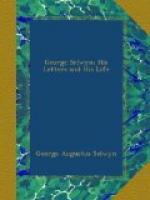I am going to dine to-day at Delme’s; he has promised me some plum porridge. His son is to dine here with George. Lady B(etty) brings him at half-hour after two. On Friday I dine at Keene’s, and in the evening George and Mie Mie come, and George may renew his addresses to the young lady. Lady Lucan desires that we should choose King and Queen at her house. I have myself no objection to anything but the dinner abroad,
Tuesday night.—No letter come. At Delme’s the D(uke) of Q(ueensberry), Storer, Hanger, and G. Fitzwilliams, Lady Ann, and the family. . . . Hare holding the Bank. The punters are, Charles, par interet, Fish Craufurd, par complaisance, and the D. of R., par betise. Storer’s patent is at last passed,(188) as Gibbon tells me. I hear no more; it is likely, for this next week, to be a great dearth of news. For be the West India Islands taken, or secured, it will be no matter I suppose of concern till Charles has made a speech about them.
(187) The historian (1737-1794).
(188) See note (99).
How close were the ties of friendship which united Selwyn with Storer and Hare has been told at the beginning of this volume: the following letter will add to the picture of the group of friends and of the diversions of London society at this moment.
James Hare to Lord Carlisle.
(1781,) Dec. 29.—I stayed at Foxley till the middle of October, and then came to Town, where, for want of other amusement I chose to take the diversion of Hazard at the House in Pall Mall, and lost near 4,000 pounds in three nights to a set of fellows whom I never saw before, and have never seen since. Though it has generally happened to me to begin the winter without a guinea, I did not make up my mind to it this year so easily as I have done formerly, because I knew that I deserved to be poor for having been fool enough to lose my money at Hazard instead of saving it for Pharaoh.
Richard played at the same place, and lost 8,000 gs., which he paid immediately, though he had declared to me a few days before that he had not a quarter of that sum in the world; but you know how to estimate his veracity on these subjects as well as anybody.
Charles, in the October meetings, lost about 10,000, the greatest part of it on Races, and the rest to General Smith at picquet. The general opinion was, that Charles was extremely partial to horses of his own confederacy; this he denies, and of course is angry to hear suspected, but you and I shall not be very backward to believe it to have been the case.
Most of the joint annuitants agreed to a proposal made to them by Richard and Charles, viz., to receive 6,000 immediately, and the remainder by instalments in three years. One of them refused to accept this proposal, and seized soon after the meeting four of Charles’s horses, which were of trifling value, and therefore bought in again at a small expense by Derby, in whose name they now stand; whether some time or other his protection may not be insufficient, I shall not pretend to say, but it is not quite out of the reach of possibility.




